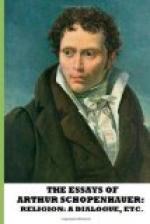Philalethes. I understand. It comes, in short, to truth wearing the garment of falsehood. But in doing so it enters on a fatal alliance. What a dangerous weapon is put into the hands of those who are authorized to employ falsehood as the vehicle of truth! If it is as you say, I fear the damage caused by the falsehood will be greater than any advantage the truth could ever produce. Of course, if the allegory were admitted to be such, I should raise no objection; but with the admission it would rob itself of all respect, and consequently, of all utility. The allegory must, therefore, put in a claim to be true in the proper sense of the word, and maintain the claim; while, at the most, it is true only in an allegorical sense. Here lies the irreparable mischief, the permanent evil; and this is why religion has always been and always will be in conflict with the noble endeavor after pure truth.
Demopheles. Oh no! that danger is guarded against. If religion mayn’t exactly confess its allegorical nature, it gives sufficient indication of it.
Philalethes. How so?
Demopheles. In its mysteries. “Mystery,” is in reality only a technical theological term for religious allegory. All religions have their mysteries. Properly speaking, a mystery is a dogma which is plainly absurd, but which, nevertheless, conceals in itself a lofty truth, and one which by itself would be completely incomprehensible to the ordinary understanding of the raw multitude. The multitude accepts it in this disguise on trust, and believes it, without being led astray by the absurdity of it, which even to its intelligence is obvious; and in this way it participates in the kernel of the matter so far as it is possible for it to do so. To explain what I mean, I may add that even in philosophy an attempt has been made to make use of a mystery. Pascal, for example, who was at once a pietist, a mathematician, and a philosopher, says in this threefold capacity: God is everywhere center and nowhere periphery. Malebranche has also the just remark: Liberty is a mystery. One could go a step further and maintain that in religions everything is mystery. For to impart truth, in the proper sense of the word, to the multitude in its raw state is absolutely impossible; all that can fall to its lot is to be enlightened by a mythological reflection of it. Naked truth is out of place before the eyes of the profane vulgar; it can only make its appearance thickly veiled. Hence, it is unreasonable to require of a religion that it shall be true in the proper sense of the word; and this, I may observe in passing, is now-a-days the absurd contention of Rationalists and Supernaturalists alike. Both start from the position that religion must be the real truth; and while the former demonstrate that it is not the truth, the latter obstinately maintain that it is; or rather, the former dress up and arrange the allegorical element




